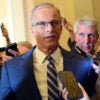The Senate has now failed to pass legislation to repeal and replace Obamacare. The longer Congress delays or avoids action, the more the problems are likely to grow and compound.
The most common and publicized problems with the law have been the skyrocketing premiums and withdrawal of insurers from Obamacare exchanges—consequences that have flown in the face of Obamacare’s backers who said the reform would increase choice and lower costs.
But the increasing cost of premiums has had additional repercussions. Larger numbers of middle-income Americans who aren’t eligible for subsidies are now struggling to pay for coverage or, as more insurers leave the market, unable to get coverage at all.
So while programs for the poor, like Medicaid, continue to grow, the private market for middle-income Americans shrinks.
Middle-income Americans are finding themselves caught between making too much to qualify for subsidized public coverage on the one hand, and fewer and less affordable private insurance options on the other hand.
The danger is that the previously insured are now at risk of becoming the new uninsured.
A paper recently released by The Heritage Foundation’s Ed Haislmaier and Drew Gonshorowski shows how the upsurge in Medicaid enrollment in 2014-2016 has come at the same time that the private market has begun to contract.
The study showed that private health coverage enrollment dropped by 587,000 in 2016, while Medicaid enrollment increased by 2.25 million people.
While the individual market enrollment increased in the first few years of the law being in place, that trend is in the process of reversing as premiums are skyrocketing.
This will dramatically impact middle-class Americans.
“Lower-income individuals who qualify for premium subsidies for coverage purchased through the exchanges are largely insulated from those costs,” Haislmaier and Gonshorowski wrote.
“However, middle-income self-employed persons—the more typical pre-Obamacare individual market customers—do not qualify for subsidies and are finding coverage to be increasingly unaffordable or even unavailable.”
Indeed, most of the expansion in coverage under Obamacare occurred by simply pushing millions of able-bodied low-income adults without children into Medicaid.
The Heritage paper authors wrote:
While health insurance enrollment increased by 15.7 million individuals over the three-year period, 89 percent of that increase (14 million) was attributable to additional Medicaid enrollment and 73.5 percent of the total (11.7 million) came from higher Medicaid enrollment in the 31 states and the District of Columbia that adopted the Obamacare Medicaid expansion.
Though some have touted Medicaid’s expansion as part of the program’s “success” to get more Americans insured overall, it is an incomplete measure of how health insurance is performing.
Medicaid has shown to deliver, on average, poorer quality care and treatment than private plans. Some data even suggest that Medicaid recipients experience worse outcomes than Americans with no coverage at all.
The quickening collapse in private coverage shows why Obamacare needs to be repealed and can’t simply be allowed to fail. Millions of Americans face a worsening situation for themselves and their families.
Members of Congress—of both parties—are doing a disservice to their country and their constituents if they don’t get rid of this destructive law.
































